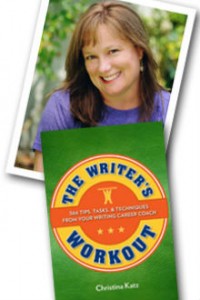
When you say the phrase “author platform” it conjures up images of an earnest writer perched high atop a teetering wooden rostrum, fingers perched above typewriter keys, their face a knot of perspiring concentration.
An interesting image to be sure, but it does beg the question of what an author platform is exactly? And why does it have so many writers, publishers and even literary agents, either breaking out in a cold nervous sweat or punching the air with excitement?
To properly define what it is, we first need to start with a description of what it used to be.
Back in them there olden days
Once upon a time, all an author had to do was write a book, and hand it to their publisher, who would distribute the book to stores, and spend a reasonable sum of money publicising it to a hopefully eager public.
While that description massively underplays the blood, sweat and tears that went into producing the book, it is a succinct and accurate description of the process as it once existed.
One downside of this old system however, was that it made it hard for writers to be masters of their own destinies. They had to hand over this aspect of their careers to a publisher since they were the only ones who could bear the prohibitive costs of marketing.

Kristen Lamb, author of Are You There Blog, It’s Me, Writer, has perfectly described the old state of affairs in her article, “Understanding Author Platform Part 1-Making Platform our Art” on her website, warriorwriters.wordpress.com:
“Back in the day, platforms were generally only available to those who could afford one. Hiring a PR expert, distributing a newsletter and even building a website were all extremely cost-prohibitive … And if we happened to be fiction authors, then just forget about building a platform. It was simply too expensive. The only way we had of building a platform or brand was through publishing our books … and that too went to a slim percentage of people who made it through gatekeepers.”
The times they are a-changing … and how
Then an almost magical thing happened. That once far distant gleam in the tech geek’s eyes became a reality. The digital revolution ushered in a new age of self-publishing and control over not only the way your book was published but the way in which it was publicised.
Almost overnight, and to the great alarm of many, authors suddenly had a degree of control hitherto undreamt of. It was an extraordinary change and heralded a whole new way of doing things for authors.

Lamb describes what this momentous tide of change meant for writers:
“Technology … finally made it fiscally possible for us to do what other artists have been doing for generations … The digital age has changed the learning curve/career path for the writer-artist.”
Writers now have the power to build their brand, reach out to their readers directly and have a direct influence on the way their books are marketed.
But with it came all sorts of questions. Chief among them was what is this author platform that so many people are talking about?
What it is and what should be in it
In its simplest terms, an “author platform”, as it has come to be known, means building a profile, and attracting a community of readers usually via a host of social media platforms such as blogging, Twitter and Facebook. While authors have always connected with their audience in one form or another, largely via bookstore tours, or appearances at writer’s festivals, or even good old “snail mail” fan letters, the contact has become much more direct thanks to these new technologies.
Whether you choose to use a website, or a blog, or a fan page on Facebook, the key to successful interaction with readers is creating what Jane Friedman, former Writer’s Digest publisher, calls “your hub”. An author’s site, which should come up immediately on Google when readers search for their book title/s, should capture the writer’s “voice” and become a one-stop shop for their readers.
At its simplest, and regardless of the social media platform, a writer needs to make sure that their “hub” has all their basic biographical information correct. It may sound like a basic element but it is critical to establishing an author’s credibility with his or her readers.
And clearly too, it’s important if the press are going to be able to easily access information about the writer. Regardless of the changes in play in the publishing world, the media are still critical to gaining the necessary visibility to appeal to a wider audience.
An author should also make sure that their site sparkles with their “voice” or personality. It’s important that visitors to the site get a sense of the sort of person whose writing the books they love. There needs to be something of the author laid bare, to whatever degree they are comfortable with.
Getting to know you, getting to know all about you
Pippa Masson, literary agent with agency Curtis Brown stresses that an author needs to determine what they will and won’t share before embarking on the creation of their platform since it will determine the nature of the conversation with fans that follows.
“It’s important to give a little bit of yourself because that’s what people want. But at the same time, guarding your privacy to the degree that you want to is very important as well. I know some people are happy to share a lot but others are not. So you’ve got to work out how much you’re going to tell before you embark on it because you can’t suddenly pull back when you’ve been freely sharing information.”

Readers no longer want to simply read the book; they want to know the person who committed the words to paper (or pixels).
Masson stresses that the key thing to remember that it is a conversation you’re having with your readers, not a sales spiel delivered to a captive audience. She advises against treating this dialogue as an opportunity to promote yourself.
“Don’t look like you’re promoting yourself too much. In social media and blogs as well, it’s not really the place to be doing that. You want people to feel it’s part of a conversation, that your readers will get to know a little bit of who you are … if you’re on Twitter, kind of sending tweets about “here’s a link to my review”, that’s the worst possible thing and really puts people off.”
Start early
One way to avoid offending people with might appear to be a blatant grab for their wallet, is to commence building your platform, and getting to know your followers before there is a need to promote a book. This won’t be possible for everyone, since many authors embark on writing first, with thoughts on where and how to publish and who to sell it to, only coming up once the manuscript is complete.

But Scott Stratten, author of Unmarketing, in a video conducted with Valerie Khoo of the Sydney Writers’ Centre says that ideally you should be building your audience is advance of the book. This is so that when it arrives, people buy it because they know you and not because you are pushing the title as if your life depends on it.
“… it really takes time to build [a] platform, so authors and writers should be building it before we actually have the need for the book itself … I had no book to pitch, no program to pitch, so it allowed me to give unconditionally. So when the book came out everybody bought it, because I had given so much already.”
Now you have them, how will you keep them?
But there is no point launching into a conversation with people when you’re not entirely sure what you will be saying. While finding your “voice is important, so too is working out your engagement strategy. In other words, what do you want to achieve when you’re interacting with your readers?

For Stratten, who places a premium on effectively using every second of his time on Twitter, this is paramount:
“It’s a business. It’s a marketing platform. It’s a tool that you should have some focus and some plan, because you spin your wheels all day on social media if you don’t have some kind of strategy.”
The strategy will vary between fiction and non-fiction writers.
Non-fiction writers, by and large, will want to establish themselves as experts in their field since that is usually why people will want to read their material. Their objective is usually to be the go-to person for information on their subject matter of choice.
Their author platform should include as a minimum:
- becoming known as the expert in your chosen field
- seeking media interviews where possible
- networking at industry events and speaking engagements
- getting gigs writing for magazines, newspapers, major media online blogs and publications
- a website that showcases your expertise with an attached blog that allows people to become subscribers
- a regular email newsletter
- a presence on Twitter, Facebook, Tumblr

Apart from increasing your visibility in your area of expertise, Stratten points out that part of your strategy should be to trial your book. See if it will strike a chord with potential readers. It’s a good bet in this wired age that publishers will be paying keen attention to your efforts and may come running.
“Well you have to understand that the writing isn’t what speaks for itself, it’s the ideas, it’s the concepts. People need to run with your concepts, they need to relate to your concepts and actually want to embrace them. The thing with building a platform is you can test those things out … It was like my own R&D.”
It worked for Stratten. In the midst of actively tweeting to his growing legion of fans, he says a publisher did show interest.
“So for me I just built a platform, I built a large following on Twitter, a big following on my blog, and the publisher came calling, and Wiley came calling, and my editor Shannon called and said, “Why haven’t you written the book yet?”
Masson underlines too your strategy should be as multi-faceted as possible. When she is looking to sign up a new non-fiction author to represent, she says she is looking primarily for people who already have a multi-faceted author platform which includes blogs, websites, even traditional media columns:
“Publishers want to know they can promote someone very easily, and if they have all those different facets obviously that helps.”

Fiction writers on the other hand tend to focus more on establishing relationships with other writers, and potential readers. In their case, their strategy should involve the following things as a minimum:
- getting to know fellow writers, publishing figures, bloggers on Twitter
- having an active blog or website (with the potential for people to follow you)
- a Facebook fan page – guest blogging on other peoples’ blogs
- becoming active in discussion forums on relevant genre websites
- constructing an email list perhaps by offering the first chapter of your book in exchange for a reader’s name and email address
Their strategy usually pivots primarily on the relationships they build (which means authors need to spend time regularly connecting with their readers), and not so much on their expertise in a certain area. Having said that though, fiction writers may choose to give writing tips, or share short stories that aren’t available in their books, or give insights in their posts on why they made a certain character behave the way they do.
Of course they may become known as a guru on the craft of writing if that’s what like to blog about, but by and large, their author platform will function as a way to facilitate relationships with fellow authors, and their readers.
But must you build a platform to succeed?
Masson believes that fiction author aren’t under as much pressure to have a platform as their non-fiction counterparts.
“We’d always recommend they have [a website] … but I don’t think it’s as integral to the book’s success as it is for non-fiction [writers].”
Even so she cautions that this doesn’t mean they shouldn’t build one, in tandem with formulating a sound engagement strategy, since the absence of a platform will mark you as a potential risk to a would-be publisher. Or if you are self-publishing may doom you to languish in the backwaters of oblivion far longer than you need to, assuming you can escape at all.
Is there more to it than just amassing fans?
With this emphasis on getting more and more eyeballs focusing just on you, you could be forgiven for thinking that this is the only focus of having an vibrant, well-thought out author platform.

But as Chuck Sambuchino, editor for Writer’s Digest books, says in his article “5 Encouraging Reasons To Build Your Writer Platform” on writerunboxed.com, having your platform also gives far more control over how you are promoted and to whom.
“… platform building means you’re establishing concrete, solid connections through media outlets, with other professionals, and/or social media channels. If you build these avenues, you can use them to sell books later. Creating a platform is an opportunity to, as writer Alex Grant put it, ‘make your own luck.’”
He also mentions that being in possession of your own direct links to your readers enables you to be the “ideal marketer” of your book since in theory anyway, no one knows your audience like you do.
In short, you have the power to control how successful you are, and what sort of career you will enjoy. While the degree of control may vary depending on whether you are signed or unsigned, the fact is that you are able to have a profound effect on the form your career takes, something unavailable to writers even a few years back.
Torn between two approaches
So while the case for having an author platform, and a workable strategy to go with it, seems reasonably sound, and agreed as necessary by most writers, not everyone agrees that it’s an absolute must-have.

While Tara Moss, bestselling author of the Mak Vanderwall and Pandora English series of novels is a firm believer in the power of author platforms, she admits that not everyone is.
“I enjoy contacting other authors and being in touch in a way that isn’t arduous or time consuming and I can also communicate with my readers in that way … [but] authors who don’t want to do it, I totally understand that. I have a lot of friends who aren’t inclined at all to social media. And that’s also completely valid. It’s a different sort of perspective or personality.”

Jane Friedman acknowledges this mindset in her article “Should You Focus on Your Writing or Your Platform?” on writerunboxed.com:
“I think there’s a backlash against some of these people, which I understand. It’s applying the get-rich-quick Tim Ferriss model to the world of literature, where we tend to believe that blood, sweat, and tears (and rejection) are demanded before you gain recognition.”
While respecting writers who don’t wish to have a platform of their own, she believes it is possible to find a happy medium between the “‘writing is all that matters’ and ‘audience is all that matters’” camps.
But whether you acknowledge the need for an author platform or not, and let’s face it most writers do, you must then decide on the philosophy that will underpin the way you operate your blog.
Should it be strictly quarantined from your writing activities and be seen simply as a sales activity?
Or is it a natural extension of your writing? Part of a wholistic approach where the writing of your book flows naturally into the running of, and writing for, your author platform?
Writing is a business like any other
John Locke, self-published author whose book How I Sold 1 Million eBooks in Five Months is packed full of advice on the best way to use your author platform, falls firmly into the first camp. He argues stridently for the fact that you need to approach your marketing activities, especially if you are a self-published writer, as a sales activity plain and simple.

His primary focus is on who his readers are, and how to establish great relationships with them, and not the writing itself.
“I wasn’t trying to become a great writer. I simply wanted to be an effective one. You might be a better author than me, and I hope you are. But my strength lies in knowing how to find an audience for the books I am writing.”
He goes on to say:
“I have never taken myself seriously as a writer, but always felt I’d be able to write effectively enough to acquire and keep 10,000 loyal fans.”
It may not surprise that he is from a sales background. For Locke, treating your marketing activities as a business activity makes perfect sense. As far as he is concerned the writing and the way it is sold to the masses are two distinct but obviously related activities.
Not everyone is a salesman
However this business-centric approach is seen by some as so unpalatable that it puts them off attempting to construct an author platform in the first place.
Christina Katz, author of The Writer’s Workout, reassures writers who fear having to be a salesman that it shouldn’t even be an issue. As far as she is concerned, operating an author platform should simply be an extension of your ordinary writing activities.

She was quoted in an article by Jane Friedman, “Distinguishing Between Straight-Up Advice and Paradigm Shift” on janefriedman.com in May 2012 as saying:
“I am a person who does not distinguish between writing, selling, specializing, self-promotion, and continuing ed, and also a person who sees all of these things as essential and necessary to my writing success … For me, there is no separation. Writing is the center [sic] … I find it impossible and irrelevant to distinguish between writing activities and platform building activities. My approach is far too holistic.”

It’s a viewpoint shared by strategic marketer and author, Matthew Turner who said on his Turndog Millionaire site in June 2012:
“Why see an author platform as something separate, when all it really is, is YOU. Your writing, marketing, networking … it’s all part of the process that you create. Rather than see it as a hindrance, embrace this engaging process because all you are doing is embracing who you are.
“It may be about creating a brand, but you’re creating a brand around you and the things you believe in. When it comes to doing something you don’t want to, surely this is a pretty good compromise.”
Lamb underlines that authors shouldn’t feel pressured to write solely about the craft of writing on their blogs (unless of course they, like her, write books about writing). They should instead make their platform a reflection of what their passions are.
If you like pop culture then make it the focus of what is featured on the blog, or cooking or whatever is a passionate interest for you. Of course you will still discuss your book but the primary focus should be on what you love so that readers get to know you, which for a fiction writer especially, is the point of having an author platform in the first place.
As Lamb says in a post “Sacred Cow-Tipping–Why Writers Blogging About Writing is Bad” on her blog:
“Here is a critical point most people miss. Fiction authors are not blogging to become experts. You are blogging to connect with as many people as humanly possible and recruit them to your team. Period. That simple.”
Non-fiction authors in contrast should blog about the subject matter of their book since that is why their audience is following them. They can certainly throw in information about any passions and interests they have aside from this since it humanises them, but they should always focus on their area of expertise.
Bottom line, your author platform should reflect you, regardless of whether you write fiction or non-fiction.
Wherever you fall philosophically, author platforms are seen as a necessity for many people, though not all, and at some point each writer will need to work out where this activity fits into their overall career plan.
But however you choose to go about letting the world know about your book, the essential fact remains that first and foremost you must produce a well-written book that everyone will want to read. No matter how much author platforms are in vogue, or what form they take, or what philosophy is behind them, the need for a book that enthralls its audience will remain the one prevailing constant in the ever changing world of books.
* This post was originally published on writing bar.com
